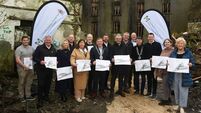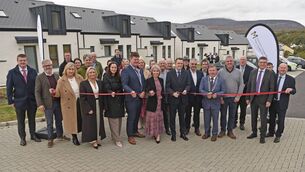'It's not a game of crude pork barrel politics... people expect you to do your job nationally'
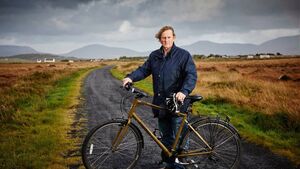
Former Taoiseach Enda Kenny pictured during the filming of his travel series Iarnród Enda in 2021.
What makes a politician from the West effective and indeed successful as a national politician? How can you best deliver for the people who put you there? In a world where local delivery in our politics is so often talked about, are there particular requirements or challenges for a politician from the West? What does anyone setting off on such a career need to appreciate about all that as they do?
As part of a series of interviews with leaders in different sectors about building a better West, I explore those questions through the career of the only person from our region to hold our highest office in government, former Taoiseach Enda Kenny.
We met over a coffee and had a long conversation about all this. The discussion was not a review of Enda Kenny’s tenure as Taoiseach, nor an evaluation of whether we have got ‘our fair share’ during his time in government or any other time. Different people will have different views on those questions as you would expect.
What interested me more was gathering some learning from a man who has held the biggest job in Irish government, the better for those who might aspire to lead a public life – or deliver for this region in any role – to understand and think about how to operate within the political world.
Enda Kenny doesn’t really need a biographical introduction. He served as TD for 45 years, firstly for the constituency of West Mayo and then of Mayo from 1975 until 2020, as a cabinet minister from 1994-97, as leader of Fine Gael from 2002-17, and as Taoiseach from 2011-2017. He fought three general elections as party Leader, doing well in 2007, brilliantly in 2011 and suffering a tough result in 2016, where the lack of credit that the government got for the economic improvements from 2011-16 clearly impacted the result and – some say – riled him. But he recovered post-election to put together a minority government, becoming the first leader of the Fine Gael party to return to the office of Taoiseach after an election. He left the office of Taoiseach in 2017 and retired as TD in 2020.
He’s known for being both good fun in company and yet reserved at the same time. He is genuinely funny and can tell a great story, and yet can be tough when he needs to be. People who worked close to him during his time as Taoiseach say that he always brought energy and focus to the role, even when things seemed very bleak – and that above all he was a decision-maker, continually bringing things to a head when others just wanted to keep talking.
Throughout his career, some people underrated him. The British Prime Minister, Clement Attlee, had a similar experience before he got the top job. In his retirement, Attlee wrote a limerick about his career, which lampooned his critics and their underestimation of him, and which went as follows:
Now if you changed all those British titles – PM (Prime Minister), CH (Companion of Honour), OM (Order of Merit) – and replaced them with the Irish titles for a republican form of government, you might well be talking about Enda Kenny.
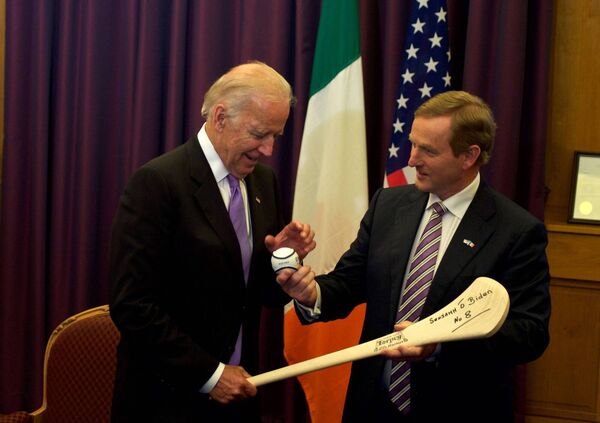
Above all, he is a West of Ireland man, very much rooted in and proud of where he is from. Shaped like so many of us by our roots as well as our engagement with the wider world, this may be part of the reason why he seemed to be as comfortable meeting the US President as someone just home to Islandeady from the Bronx. Like many from our part of the world who were influenced by what was the American 20th century, he has a touch of the Yank about him.
His thoughts on these questions are a unique take, from the only holder of the office of Taoiseach who was born, lived in and represented the part of the country west of the Shannon.
“It’s an exciting career," he says, but you have to feel the “adrenalin rush” in it to want to do it. You must be interested in people, and like them, and like listening to them. You must have an ability to absorb and appreciate the issues of the day, in your community and nationally. You must have the character and personality to be able to handle all the competing demands and pressures.
“Public service and public life,” he says, “are about what they say – public service.”
This must be your guiding principle. If that isn’t your feeling, Enda Kenny would say that life isn’t for you. You need energy, discipline and yes, a bit of cuteness, and above all, you must be true to yourself and what you are about, even if that means sometimes telling people things they don’t want to hear – otherwise people will quickly see through you. He says he was lucky to be coming near the end of his career by the time social media commentary became such a feature of public life. But he, of course, recognises that to become a successful national politician, you have to be ready and able to talk yourself up in a national context.
It is also the case that being a politician from our region brings with it extra challenges and sacrifices. You will be on the road a lot and that takes its toll too.
Ultimately, he concludes, you get involved in something local, you build yourself up, and go from there, but if you conclude at some stage that the career isn’t for you, you should leave and do something else with your life. If you are publicly minded, there are lots of ways to make a contribution.
We talked a lot about the question of delivery. There is an assumption that any successful politician from our region needs to be seen to deliver big local projects and that that is the defining aspect of someone’s contribution. For that reason, much of our debate and expectations around our elections is on what projects can be returned locally – what Jackie Healy-Rae once defined as ‘getting value for your vote’.
Enda Kenny, as you might expect from someone who became Taoiseach, is a little unimpressed by that kind of thinking. His view is that wherever a politician is from, and most certainly from his experience in Mayo, your constituents “expect you to do your job nationally”. He has a lot of trust in people’s good sense about that – of their understanding of what your primary duty is. Several experiences brought it home to him. He recalls a man approaching him in the streets of Castlebar when he was a young TD on a Dáil sitting day and asked him why he wasn’t in the chamber. He also cites his experience in the 1997 election, where the pressures of his Ministerial job had meant that he was away a lot on official business, something which many told him could risk his seat. The opposite was the case and Fine Gael won three seats in that election, on a day in the count centre when Enda Kenny was held aloft holding up three fingers on each hand, capturing the image of the day for the photographers.
When he became leader of Fine Gael back in 2002, he sensed that the pride locally about it was primarily rooted in the sense that “one of our own has achieved a national status”. This came into even sharper focus when he became Taoiseach in 2011. It is, of course, true that the particular circumstances of that time shaped his approach – how could it not in those dark days – but his point is clear: he was elected in Mayo and nationally to fix the national economy, and to do it by making tough decisions head-on. If it looked like he was spending all his time on local issues, it seems clear to me that he would have been pilloried because, as he puts it about the time, “the over-riding objective was to have a functioning economy”. As an example of this, he reminds me that within two days of becoming Taoiseach he was fighting off an attempt by the French to increase our Corporation Tax rate. It is worth noting that pretty much every bit of extra spending in Ireland over recent years – including in the recent budget – has come from Corporation Tax receipts.
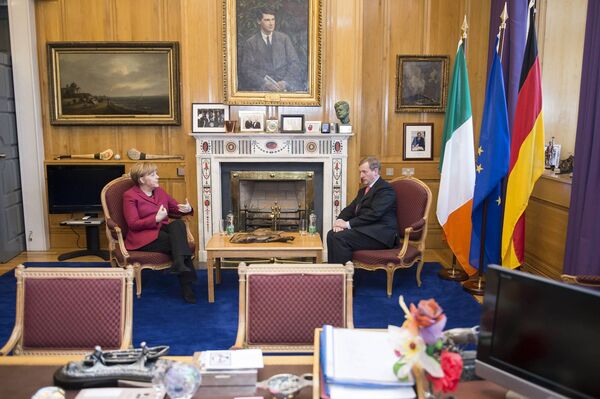
Securing what is needed for our region isn’t, he says, a game of crude ‘pork barrel’ politics. While focused on your national responsibilities, “you are not going to forget where you are from – nobody would think that”, but it is precisely the unambiguous focus on the national issues that gives you the credibility to influence some important things locally.
The politician’s role in developing the infrastructure and support we need for our region is mostly based on understanding and shaping how national policies and programmes can be utilised to benefit the region and supporting the efforts which are made to access funding for projects under them. So, in that sense, working with highly professional people involved in our community life, whether in the local authority, community, business, or voluntary sectors, to articulate and advance regional needs which fit into the groove of national policies, is the key part of the role. He referred particularly to the importance of strong County Councils having a plan and vision for their areas, a factor which makes the job of national delivery much more feasible. Following on from all that – it seems to me – that all this is much more important than any notion we might have of the traditional Chieftain returning from Dublin with their spoils.
He acknowledges himself that when a national politician holds an influential position, it is natural for people locally to want some ‘gloss’ to come their way. That, he says, cannot be the primary focus of the individual, but at the same time a politician who has established their nationally-focused credentials can identify “occasions where you have to shove things along”. This is done by what he delicately calls “displaying interest” in a particular issue.
How that process precisely works would perhaps need a further article but it works a bit like this: displaying interest is a way of showing influence, and the art of politics is about influence, and compromise and engagement and cuteness and information. All those things together can produce outcomes. When I put it to him that it is the widespread presumption that his time as a Minister from 1994-97 was not unhelpful to securing the campus of the National Museum of Ireland for Turlough, he quipped “and that presumption is not incorrect”. More routinely, it is the case, as he acknowledges, that an individual Minister “has to leave something in your own constituency while you are there”. But it is clear from our discussion that, like all these things, must only be done with discernment and not too often. What I took from that is that if you were to spend all your time thinking about how to deliver locally, you would not be taken seriously and you would be torn from one local issue to another. In a world of competing demands, people know – as he stresses – that first and foremost you must do the job you were elected to do, to be a national politician who wants to make decisions.
You must learn, he says, about how to manage those pressures and not have that hanging over you – you can’t be worrying about that all the time as you go about doing the main job. Your capacity to do that “depends on your personality and character".
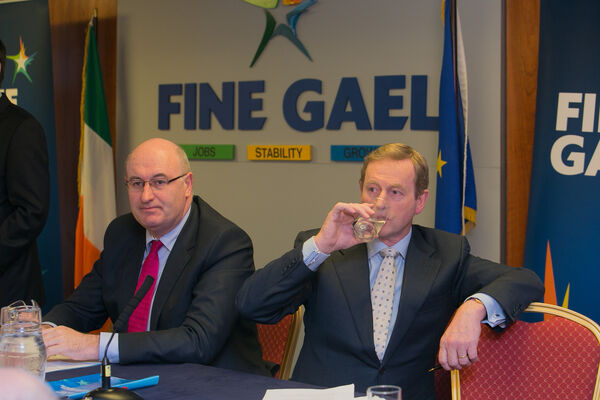
My own perspective is that every politician has to make their own choice about how to operate at national level. Enda Kenny in this interview set out his approach. You can choose other approaches, like being a backbencher, locally focused and hoping for the day when your vote in Dáil Éireann might make all the difference. The danger is that if you do that, you can end up – as many have – sitting on the sidelines while the big decisions go by. That is a call every individual has to make – and that every voter needs to weigh up at election time.
In terms of those who are working to promote the West and build up its social, economic and cultural infrastructure, the lessons about how to do it are clear. Rather than relying on some great Chieftain to fix our problems, this is a professional job requiring expertise and excellence, making great local cases that understand national programmes and policies and target spending and infrastructure requests within the groove of those national plans. We are quite good at this already, but we need to keep building our capacity to do it and articulate it most effectively. We need to understand how the political system operates and work with our politicians to best deploy their interest and influence at the right time. What is perhaps needed is to close the gap between how well this entire process is understood by some in leading roles in our region and the general public, the better to allow our politics and thus our politicians to be more strategic.
A good example of this disconnect is the recent development of the new road from Turlough to Westport. Much of the talk locally among the public is about the current usage of the road, whereas its actual importance is for the future. Enda Kenny spoke about the road as something that will “change the economics and the dynamics of this region”, in terms of industry, new jobs, what can be built and where. It is a development piece for the future, not just a way to reduce the number of cars on the old road. But its existence did again raise in our conversation the question of whether his influence or interest in it had been in any way helpful: again, he was much too judicious to directly claim any credit for it. But this writer and I am sure the reader can understand the presumption that as with the Museum, his role as Taoiseach was not unhelpful. How exactly, perhaps some other interviewer will in time discover.
But notwithstanding that little aside, his main point still holds firm. To be a successful politician from our region requires you to be focused on your national duty, though there is no doubt that the desire for politicians to deliver locally hasn’t gone away. On these questions, this was his take as shared with me – others will have different assessments of where the balance between national and local duty should lie. The judgement on that becomes a legacy matter. I asked him about that and it was a topic he had no interest in: any politician’s legacy, he said, will sort itself out. All he would say on that subject was: “I did my best – that’s it.”

